Secret Messages: "You Are Crazy"
 Tuesday, July 12, 2011 at 10:52AM
Tuesday, July 12, 2011 at 10:52AM  Secret Messages
Secret Messages The Film Experience™ was created by Nathaniel R. All material herein is written by our team. (This site is not for profit but for an expression of love for cinema & adjacent artforms.)
Follow TFE on Substackd
 Tuesday, July 12, 2011 at 10:52AM
Tuesday, July 12, 2011 at 10:52AM  Monday, July 11, 2011 at 10:16PM
Monday, July 11, 2011 at 10:16PM There's a new gay film from Casper Andreas (Violet Tendencies, Slutty Summer) making the festival rounds. In fact, it's currently playing at Outfest in Los Angeles. The film is an adaptation of the comic memoir novel Going Down in La La Land which chronicles the adventures of a naive young actor who gets mixed up in porn/hustling when he tries to make it in Hollywood. As one does. Model/actor Matthew Ludwinski has the lead role.
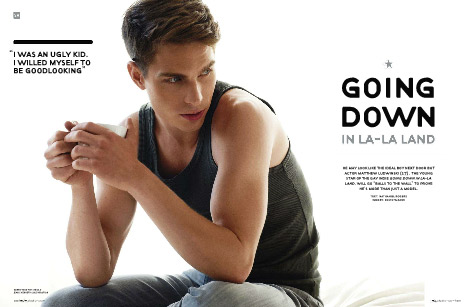 Matthew Ludwinski photographed by David Waage for Mate Magazine
Matthew Ludwinski photographed by David Waage for Mate Magazine
I recently interviewed him for global queer culture magazine mate (previously known as "winq") and that's the splash page for the start of the article above. Interviews can be tricky -- especially if the interviewee doesn't have a big resume to talk about -- but Ludwinski and his photographer David Waage for this profile were very friendly and fun. [Clicking on the image will take you to the magazine where you can sample bits or purchase.]
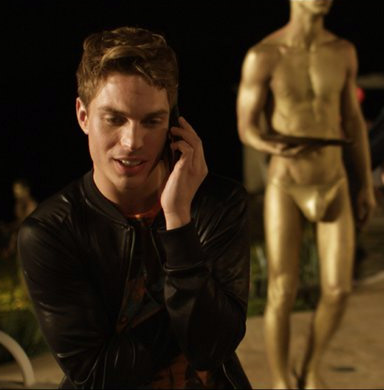 an Oscar Party scene from the filmI thought I'd share a bit that I couldn't squeeze into the article. There's an Oscar party scene in the film, where the staff is naked and painted gold (Hey, I had that idea like ten years ago... but alas, my parties are not that well funded). So when I sat down with Ludwinski at the hotel, given this Oscar party scene, I had to ask him about working with the Academy's favorite joke writer Bruce Vilanche, who plays a porn director in the film.
an Oscar Party scene from the filmI thought I'd share a bit that I couldn't squeeze into the article. There's an Oscar party scene in the film, where the staff is naked and painted gold (Hey, I had that idea like ten years ago... but alas, my parties are not that well funded). So when I sat down with Ludwinski at the hotel, given this Oscar party scene, I had to ask him about working with the Academy's favorite joke writer Bruce Vilanche, who plays a porn director in the film.
We ended up discussing the Franco/Vilanche Oscar night fallout kerfuffle very briefly.
Was Vilanche funny in person?
Hilarious. For a couple months afterwards he would send me dirty text messages. I always appreciate that.
Two of my favorite photos from the shoot after the jump...
 Monday, July 11, 2011 at 7:30PM
Monday, July 11, 2011 at 7:30PM Another Monday, another day spent thinking about last night's True Blood eppy. My favorite B story thread this season is definitely Arlene's devil baby so we must begin with my single favorite shot in the episode. The little monster slobbering all over Jessica's Capital C Creepy family heirloom doll.
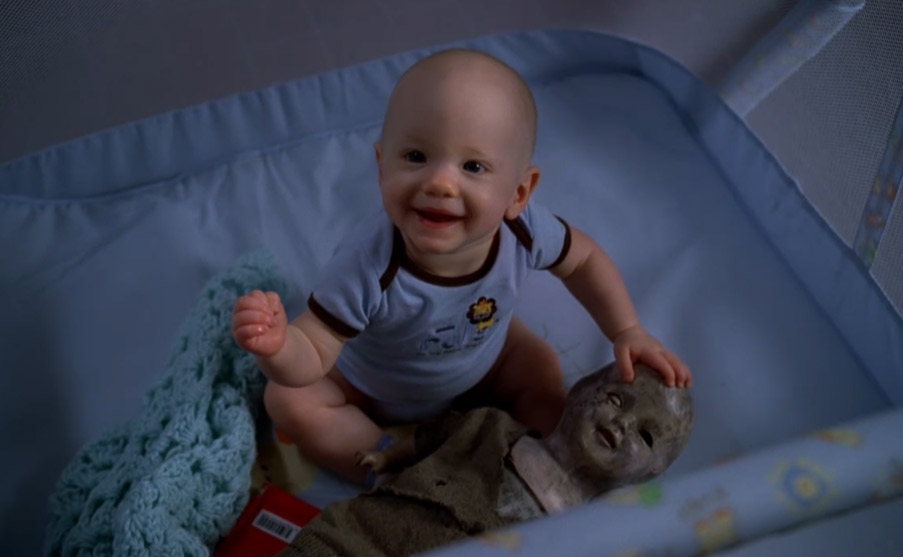
He's so cute. Don't you just want to procure victims for him and grind them up into mushy baby food?
"If You Love Me, Why Am I Dyin'?" is a solid episode but can't help but feel like a smidgeon of a comedown after last week's instant classic in which Eric was robbed of his memories by the new witch coven led by Marnie (Fiona Shaw). This week's episode provided several fun moments and some promising future-implications but the plot mostly was little beats in which characters were trying to decide how to deal with the major events of the previous episode: where should Sooki hide Eric? is Tara getting sucked back in for good? will Lafayette's fear of Eric continue to get everyone in trouble? who is Pam going to eat if she gets too angry? exactly what is Marnie channeling?
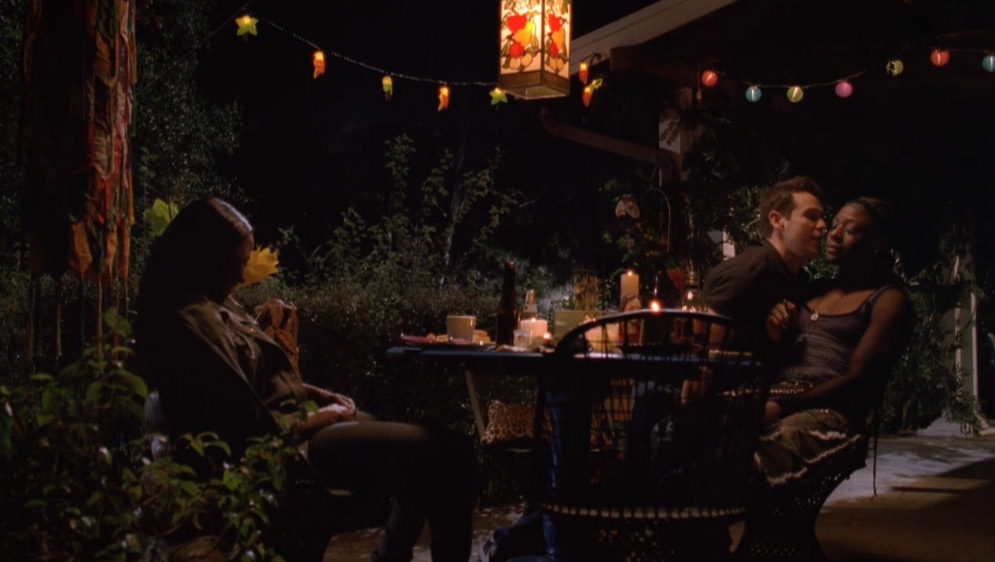 Cheers: True Blood is giving both Lafayette and Tara more subtle emotions to play this season.
Cheers: True Blood is giving both Lafayette and Tara more subtle emotions to play this season.
The major B story his season appears to be Jason's stud captivity in that redneck nightmare village (they mean to use him to sire new werepups). Someone rescue him!
 Reviews,
Reviews,  TV,
TV,  True Blood,
True Blood,  sci-fi fantasy horror,
sci-fi fantasy horror,  vampires
vampires  Monday, July 11, 2011 at 5:30PM
Monday, July 11, 2011 at 5:30PM  JK Rowling hugs her child stars, all grown up.Since some of you Potterheads (Potterphiles?) haven't been too pleased with my flippancy about the world's most beloved film series I thought I should point out these neat morphs over at MSNBC which allow you to watch Harry, Hermione and Ron age up whilst Daniel Radcliffe, Emma Watson and Rupert Grint contemplate their goodbyes in voiceover.
JK Rowling hugs her child stars, all grown up.Since some of you Potterheads (Potterphiles?) haven't been too pleased with my flippancy about the world's most beloved film series I thought I should point out these neat morphs over at MSNBC which allow you to watch Harry, Hermione and Ron age up whilst Daniel Radcliffe, Emma Watson and Rupert Grint contemplate their goodbyes in voiceover.
It even got to me and I am no fan of the series. Because really... when something gets as huge as Harry Potter does it ends up being the culture and this is ten years of all of our lives that we're now saying goodbye to. We're all ten years older... *gulp*. It's just some of us are more eager to move on than others ;) MSNBC Movies is naturally devoting a lot of attention to this moment when "It All Ends."
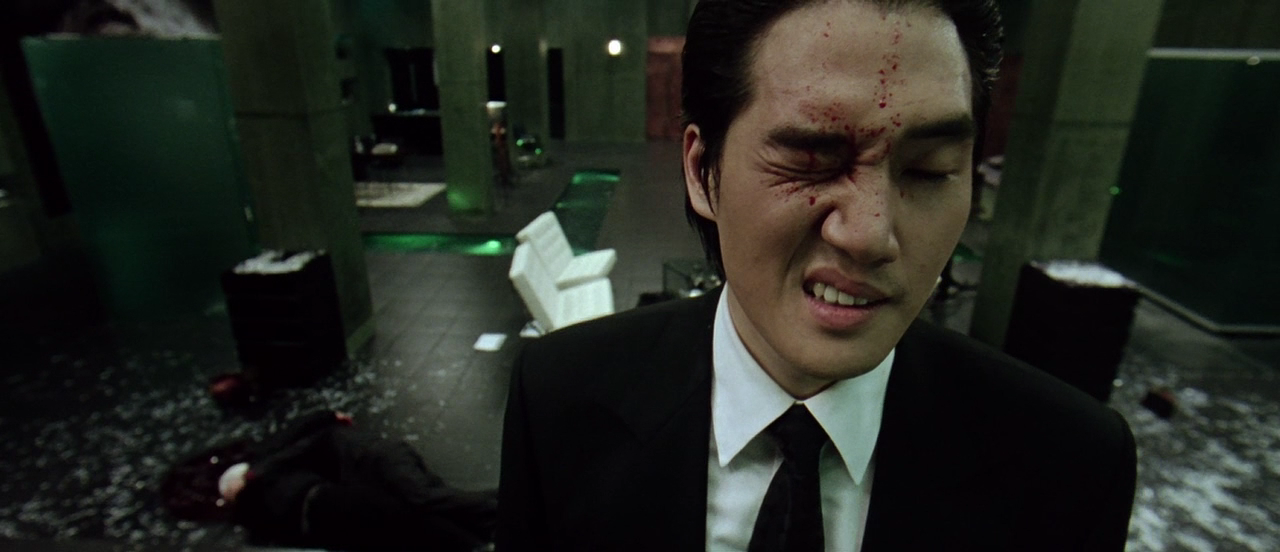 OLDBOY. But why remake it?Links
OLDBOY. But why remake it?Links
Twitch just when we were beginning to wonder if Spike Lee would ever make a movie again he signs on for two. He'll direct the remake of Oldboy but first he'll recreate his character "Mookie" for his new joint Red Hook Summer. So little Spike and then a lot of it. Who knew?
Grantland on "The 'Poor Jen' Problem". Molly Lambert is like my new favorite essayist this month.
IndieWire in 'this is very cool' news AMPAS has announced a partnership with the Alama Drafthouse to preserve it's always awesome retrospective film posters.
Movie|Line wishes for Helena Bonham Carter to never stop with the personal uninhibited awesomeness. Like admitting she peed herself while shooting Harry Potter.
IGN the DVD Blu Ray release of Thor will include a sneak peak at The Avengers. This should surprise virtually no one.
Finally...
Let's end with a "5 Second Film" starring Juliette Lewis.
p.s. that's exactly what I scream when I see Juliette Lewis only I run *towards* her. In case you missed my interview with her last fall -- she was awesome -- that was here.
 Harry Potter,
Harry Potter,  Helena Bonham Carter,
Helena Bonham Carter,  Juliette Lewis,
Juliette Lewis,  Oldboy,
Oldboy,  Spike Lee,
Spike Lee,  Thor
Thor  Monday, July 11, 2011 at 3:00PM
Monday, July 11, 2011 at 3:00PM Have any of you seen I Am Number Four? In a brain dead mood -- it's summer, it happens -- it was watched right here. At first I thought I might write up a whole review. Its jumbled five or six films in one chaos might be worth savaging as it continually reveals itself as a member of the "we're making this shit up as we go along!" school of storytelling. Pettyfer is number four of a race of escapee aliens who are being hunted on Earth by their old nemesis and they're being killed in numerical order. I'll give you one guess as to how many of them are already dead.

Number three is dead.
Good guess!
I knew nothing about I Am Number Four's origins but immediately assumed it was based on a comic or graphic novel due to its continual expository mythology. All this for one stand alone feature? It must have fuller origins elsewhere.
But in the end the movie is too disposable and harmless to be mean to. So let's just focus on the troublesome pet peeve: Alex Pettyfer's Magic Hands.
Pettyfer knows he's an alien and he knows he's number four but he doesn't actually understand his own powers yet and strange things keep happening to his body, like pulsing blue light from his hands. Pettyfer is a bit too, um, well-developed for I Am Number Four to double property as a puberty metaphor but it seems to be trying anyway. Once he starts using those hands his powers seem limitless. His hands are always ready with some solution: lock-picking, energy blasts, heat generation, super strength, you name it. At one point when he just decides to use them as flashlights in a dark room where key exposition secrets are hidden we had to add our own dialogue from the couch: "I've got an app for that, too!"

There's just nothing those mitts can't do.
Note to all filmmakers of this and Green Lantern and anyone taking on any future heroes with undefined powers: it doesn't work. If your hero's gifts are never defined there are no stakes. You can't push them to their limits for a dramatic climax if you've never given any indication that they have any. Think it over.